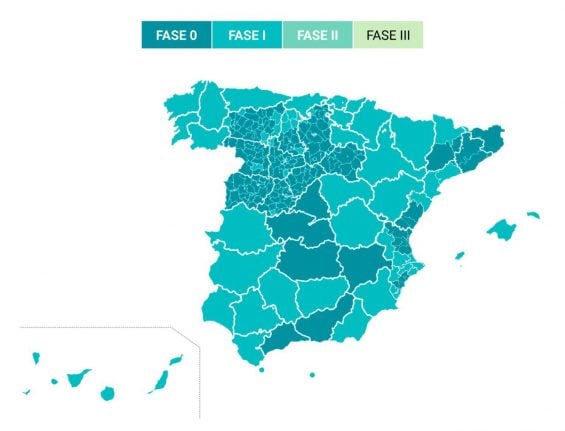Health Minister Salvador Illa and Health Emergency Coordinator Fernando Símon appeared in a televised press conference on Friday evening to announce which provinces would be able to lift a series of restrictions on May 11th.
Illa said that some 51 percent of the Spanish population live in provinces that will move to Phase 1 on Monday.
The map shows in light blue the provinces that can advance to Phase 1, while the darker shade represents those provinces that will remain in Phase Zero for at least another week.
All of the Canary Islands and the Balearic Islands will see the next stage of restrictions lifted as well as Spain's two North African city enclaves, Melilla and Ceuta. Much of northern Spain will also pass into phase 1 including the whole region of Galicia, Asturias, Cantabria and the Basque Country, La Rioja, Navarra and Aragon.
In Castilla La Mancha, two of the five provinces – Cuenca and Guadalajara – will move forward to Phase 1 while Toledo, Albacete and Ciudad Real will remain in Phase Zero.
But only some parts of some provinces in Catalonia, Castilla y Leon and Valencia will be moving forward on Monday after different Health Authoritiy zones were established beyond provincial borders.
Moncloa have produced an interactive map to help work out exactly what these are:
Hoy varias provincias y territorios de España pasan a la #Fase1.
Consulta si el tuyo es uno de ellos?https://t.co/tIcV4SPcpD
Estas son las medidas de alivio en estas zonas?https://t.co/0ACjdA4QCx
Y las nuevas condiciones de movilidad y transporte?https://t.co/3jwAis2rpf pic.twitter.com/D6dmTTEyHv
— La Moncloa (@desdelamoncloa) May 11, 2020
But the Madrid region, which has recorded a third of the country's 26,299 coronavirus-linked deaths, was excluded.
It was rebuffed despite the regional government requesting the central administration relax the capital's lockdown, which led to a dispute over which Madrid's top health official reportedly resigned.
“We felt it was not appropriate to move to the next phase… This is not a race,” said Health Minister Salvador Illa.
The second most-affected region Catalonia including its capital Barcelona will also have to wait, but it had not requested measures to be eased.
In Andalusia, the provinces of Malaga and Granada will remain in Phase Zero while the other provinces will move into the next phase, which allows gatherings of up to ten people and for restaurants and bars to open tables outside.
A full breakdown of the new measures allowed under Phase 1 will be published in the Official State Bulletin (BOE) on Saturday, said Illa, but some guidelines have already been announced.
READ MORE:



 Please whitelist us to continue reading.
Please whitelist us to continue reading.
Member comments